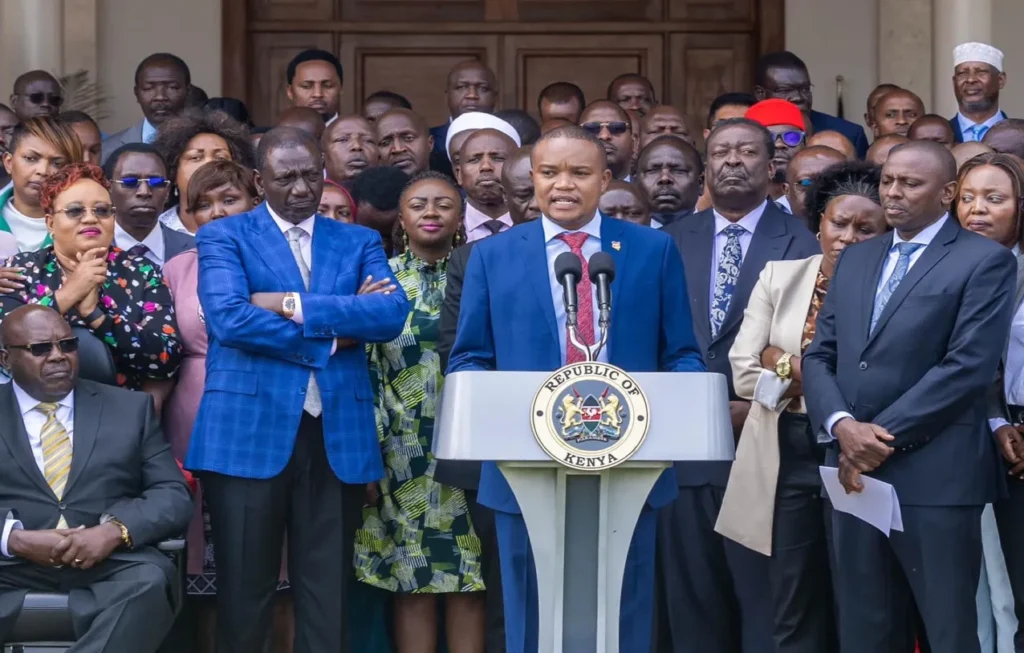President William Ruto has defended the changes made to the Finance Bill 2024, saying that they took into account the views of Kenyans.
Speaking after a Parliamentary Group meeting of the Kenya Kwanza Alliance on Tuesday June 18, 2024, Ruto added that the proposed changes also took into account the views of other stakeholders.
The PG, held ahead of debate on the Bill on the floor of the House beginning Wednesday morning, approved the removal of several proposals on the Bill, in what the President said was a decision made in line with the concerns raised by Kenyans.
“We are going to end up with a product in Parliament that came from the Executive and has been interrogated by the Legislature. Through public participation, the people of Kenya have had a say,” Ruto said.
Some of the proposals dropped include 16% VAT on bread, transportation of sugar, financial services, foreign exchange transactions as well as the 2.5 per cent Motor Vehicle Tax.
Additionally, there will be no increase in mobile money transfer fees, and Excise Duty on vegetable oil has also been removed.
Levies on the Housing Fund and the proposed one on Social Health Insurance will not attract income tax, putting much more money in the pockets of employees.
The proposed Eco Levy will only be imposed on imported finished products that contribute to e-waste and thus harm the environment when they are no longer in use.
Consequently, locally manufactured products, including sanitary towels, diapers, phones, computers, tyres and motorcycles, and I’ll not attract the Eco Levy.
The President said the government is making efforts to curb importation of products that can be locally produced, thus protecting local manufacturing and securing jobs for the people.
“The stability you see in the foreign exchange regime is a result of our deliberate policies to reduce imports of things that are produced locally,” the President said.
He said the Eco Levy will be imposed on imported finished products, while those locally manufactured are exempted.
Consequently, locally manufactured products, including sanitary towels, diapers, phones, computers, tyres, and motorcycles, will not attract the Eco Levy.
The threshold for VAT registration has been increased from KSh5 million to KSh8 million, meaning that many small businesses will no longer need to register for VAT.
The electronic invoicing ETIMS, recently introduced by the Kenya Revenue Authority, has been rescinded from farmers and small businesses with a turnover of below KSh1 million.
The Finance Bill has also imposed excise duty on imported table eggs, onions and potatoes to protect local farmers.
In the Bill, excise duty on alcoholic beverages will now be taxed based on alcohol content and not volume.
Additionally, pension contributions exemption will increase from Sh20,000 per month to Sh30,000.
On his part, President Ruto said that more resources have been allocated to education because it is the greatest equaliser
“The money we are putting into education is not an expenditure; it is an investment because we are investing in the future of our children,” he said.
He said Sh18 billion has been provided for the employment of Junior Secondary teachers who are on internship.
He said funds have also been provided to hire 20,000 interns next month.
At the same time, President Ruto said the Executive and the Legislature will continue to work together in making the right decisions for the country.
President Ruto said tough decisions have yielded fruits, citing the drop-in inflation from 9 per cent in 2022 to 5.1 per cent in May and strengthening of the shilling against the dollar.
He said the government is working on achieving a balanced budget in the next three years, pointing out that this will reduce borrowing and ensure that the country lives within its means.
President Ruto said the new university funding model has revolutionised the financial situation of public universities, noting that parents who can afford to pay for their children’s education have not applied for scholarships, freeing up more money for students from poor families.
Molo MP Kimani Kuria, who is also the chairperson of the Finance Committee in the National Assembly, said the Finance Bill aims to generate an additional KSh302 billion in revenue, which is intended to bolster the projected total revenues for the year to KSh3.3 trillion.


